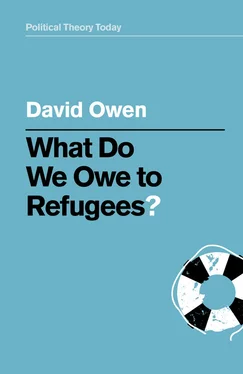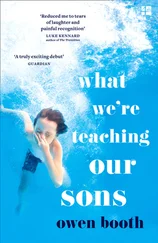The dilemma constructed by the coexistence of these different pictures is both political and philosophical. It is political, first, because it generates ethical indeterminacy concerning who should count as a ‘genuine’ refugee, and this indeterminacy is often exploited by politicians and media commentators for their own purposes. Second, this indeterminacy makes it difficult to hold states politically accountable for their responses to flows of asylum seekers (even if a shared legal definition of ‘refugee’ is adopted for policy purposes), precisely because both the nature and the extent of their duties are conditional on how the institution of refugeehood is conceived of. Politicians often claim that ‘we’ have done ‘our fair share’, but what, if anything, does the appeal to ‘fair shares’ mean in this context? Consider two facts:
1 In 2018 the UNHCR estimated that there are 25.4 million refugees worldwide and a further 3.1 million asylum seekers whose claims have not yet been assessed, and that 85 per cent of the world’s refugees are hosted in the developing world (Turkey, Uganda, Pakistan, Lebanon and Iran being the top hosting states), while only 102,800 refugees were granted resettlement places (typically in the developed world). 9
2 The major funders of the UNHCR are the United States, the EU, individual states in the developed world (including those in the EU), oil-rich Gulf states, and private donors based in developed world states. 10
Does this represent an unfair division of responsibility for refugee protection? On the one hand, the developed world takes in a relatively low percentage of the world’s refugee population under the UNHCR’s definition – one that has declined from about 25 per cent to about 15 per cent over roughly the last decade. 11Indeed, many of the states of the developed world have spent the past 30–40 years deploying non-entry policies designed to prevent those who seek refuge from reaching their borders in order to claim asylum, while offering little in the way of resettlement places. 12On the other hand, these same states and their citizens provide the overwhelming bulk of funding for the UNHCR as the primary agency of refugee protection. How, then, should ‘fair shares’ be determined? On the basis of numbers of refugees admitted? On the basis of contributions to the costs of protection? By reference to the wealth of states? Answering such questions requires a determinate account of who is entitled to refugeehood, of what is owed to refugees, and of what norms should govern a fair scheme of international cooperation; but this is precisely what is lacking. 13In the absence of an adequate account of the institution of refugeehood, the appeal to ‘fair shares’ lacks any determinate content and cannot underwrite domestic, international or transnational processes of holding states accountable with respect to refugee protection. This lack of determinacy is no doubt part of its rhetorical appeal.
The dilemma created by the coexistence of the two distinct pictures of refugees is also philosophical. It is so for the obvious reason that it raises the challenge of working out an adequate normative account of refugeehood in the face of two contrasting and incompatible views. But the challenge is philosophically deeper than that because, if it is to be satisfying, such an account must also make sense of the grip that these two pictures have established on our ethical and political imaginations. How, then, should we take up this challenge? The guiding thought of this book is that this task is best accomplished by providing a normative reconstruction of the point and purpose of the institution of refugeehood that is grounded in attention to the historical emergence and development of this institution and to the conditions of political legitimacy of the international order of states within which the institution of refugeehood is situated. 14The book’s hope is that such an account will enable us to make sense of how we have reached our current predicament, to understand the inadequacies of both pictures, and to provide an alternative view, which should enable us to return to the ethical and political challenges of refugee protection with a renewed understanding of the ground, justification and value of the international refugee regime – and of what it requires of us. The argument unfolds across four chapters.
The first chapterbegins with an historical overview of the making of the modern refugee regime that aims to make sense of the grip that the humanitarian and political pictures of refugeehood hold on us by tracking their roots and the practical interactions between them. This historical reconstruction of the modern refugee regime provides the basis for the second chapter, which offers a conceptual reconstruction of the normative function of the institution of refugeehood that aims to move beyond the humanitarian–political opposition. Central to this account is the role of this institution in relation to the conditions of political legitimacy of the international order of states. Refugees, it is argued, are people for whom the international community must stand in loco civitatis, that is, as a substitute for their own state. 15What this relationship demands, it is proposed, can vary according to whether refugees require asylum, sanctuary, or refuge. The first is exemplified by the case of the people who have reasonable grounds to fear persecution by their home state (or by non-state actors from which their state is unwilling to offer protection); the second, by people fleeing generalised violence and the breakdown of civil order; the third, by people fleeing specific state failures such as famine or natural disasters such as floods (where the line between ‘state failure’ and ‘natural disaster’ is typically blurred). The argument distinguishes general obligations owed to all refugees and particular obligations owed to each of these three types of refugee.
In chapter 3I turn from this conceptual reconstruction of the normative function of the institution of refugeehood to the question of responsibility for refugees, of who owes what to whom. This chapter may be viewed as an exercise in ‘ideal theory’, in the specific sense that it aims to lay out the responsibilities that states ought to acknowledge and act on, independently of their willingness to do so. Here I address the different responsibilities owed to each of the three types of refugees and their implications for the sharing of overall responsibility for refugees, before turning to consider the criteria that should govern the allocation of responsibility for refugee protection. The final chapterreturns to reflection on the current refuge regime – its limitations and challenges – in a world in which many states don’t generally comply with their obligations. It asks what factors help to explain this non-compliance and considers how compliance might be encouraged, before turning to ask what implications this condition has for the duties of the international community, of non-cooperating states, of their citizens, and of refugees.
1 1. Kelly Oliver (2017) refers to this warehousing as ‘carceral humanitarianism’.
2 2. Parekh (2017) provides a detailed analysis of this problem.
3 3. The case of the European Union – the regional body perhaps best placed to engage in such cooperative practices between states – demonstrates that securing such cooperation is extremely difficult to achieve. Rather than coordinated refugee protection, the EU has witnessed a crisis of integration and a resurgence of nationalist populisms, of which Italy’s Matteo Salvini is simply one manifestation.
4 4. The final draft of the Compact can be found here: https://www.unhcr.org/events/conferences/5b3295167/official-version-final-draft-global-compact-refugees.html. This agreement was adopted on 17 December 2018. Only two states voted against it – the United States and Hungary.
Читать дальше












